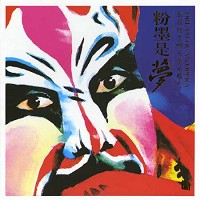For the past couple of years China has been a growing focus of all areas of popular media, and especially with the approaching Olympic Games it’s nearly impossible to escape daily stories, in-depth reports, and analysis of one or another aspect of Chinese culture in magazines, on the radio or television, or on the internet. One area about which Westerners know next to nothing is Chinese music, and any mention of “Chinese opera” is likely to be met with some silly imitation of thin, high-pitched singing and twangy instruments. Well, if that’s your only reference, you should definitely check out this CD from Rhymoi Music (available through its very well-designed website); your preconceptions will be dispelled within a minute or two as you listen to these 10 popular excerpts from “the best known operas, chosen from an archive of thousands.”
According to the notes, these pieces are “each distinctly representative of a local culture” and feature works from the operas of Zhejiang Yue (Dream of the Red Mansion), Kunqu (Peony Pavilion), Peking (Drunken Beauty), Shanghai (Buddhist Arhat Coin), Szechuan (The Bramble Hairpin), Huangmei (The Cowherd and the Weaver Girl), Canton (Madame Butterfly), and others. Surprisingly, this program is not about singing–instead the Chinese instruments serve as a substitute for the voice (often sounding exactly like one!), and the result is an immensely satisfying excursion during which we’re accompanied by several of China’s finest musicians–a “top-tier master of the junghu” and famous virtuosos on gong and lute among others. The orchestral settings often sound like what we might hear on a film soundtrack, but the musical sensibility is definitely of Chinese origin, defined by the curving, bending melodies and the fascinating array of indigenous instruments.
I truly had no idea what to expect before listening to this, but I came away with a surprised appreciation and just a little bit more understanding of what Chinese “classical” music is about. Of course, as the producers very openly acknowledge, for this program “the thinness and delicacy of Chinese opera is exchanged for a stronger, rounder, and warmer sound” as a contextual aid to Western listeners, and for me at least, the approach worked: I’ll not hesitate to listen to more offerings from this source, a label that obviously takes great care to honor its prospective listeners with thoughtful, accessible programs and recordings of high technical quality.
































